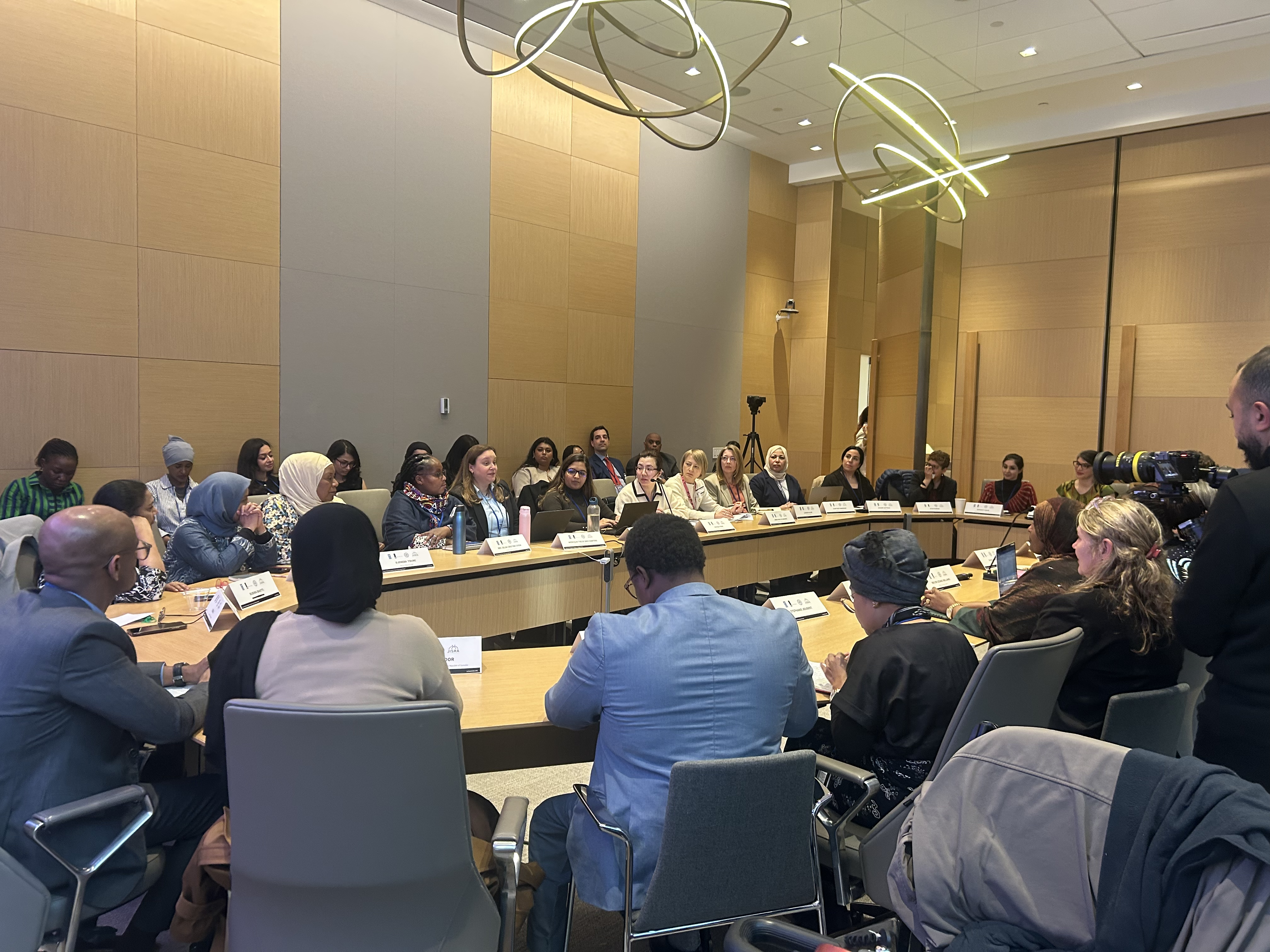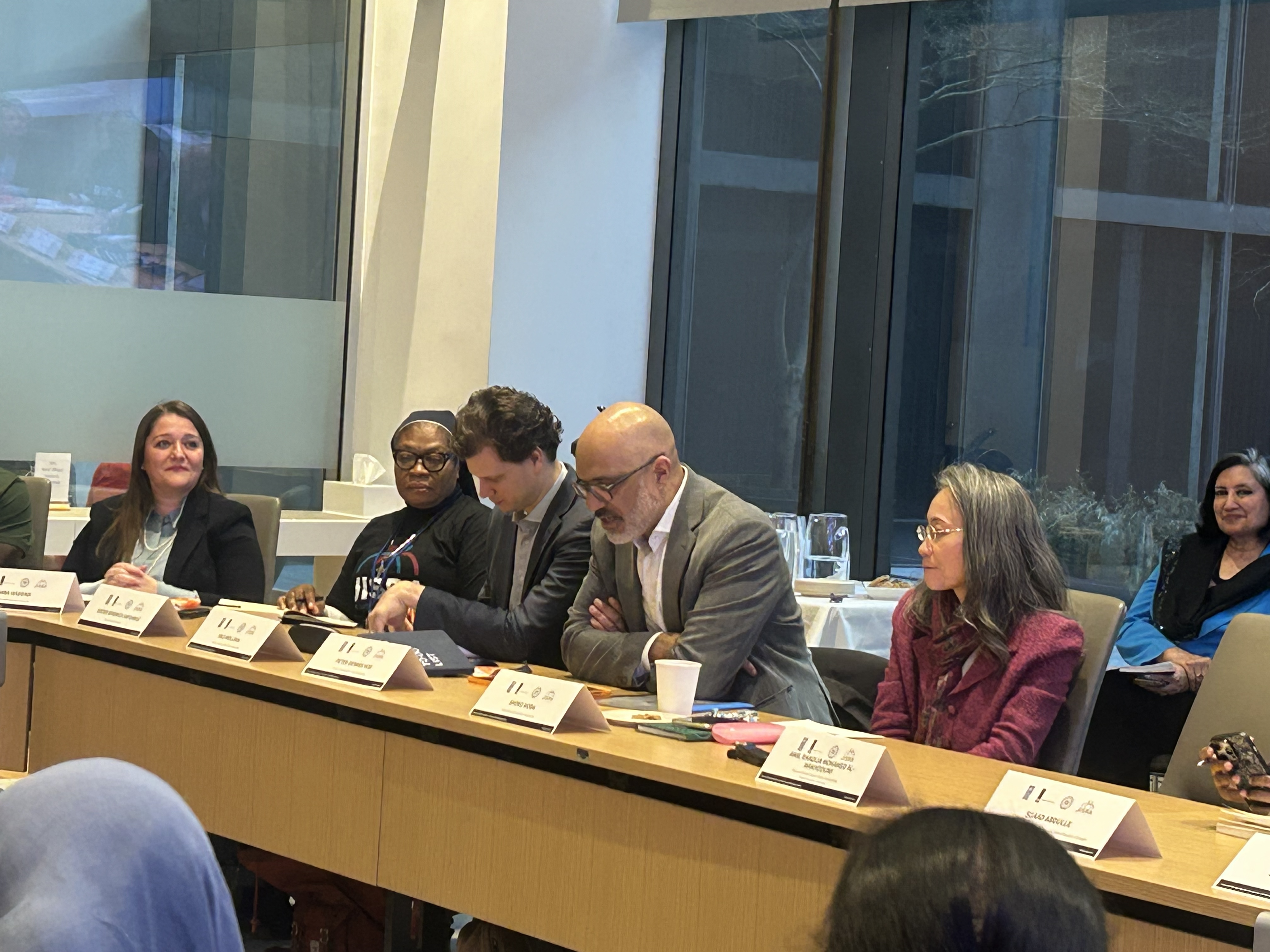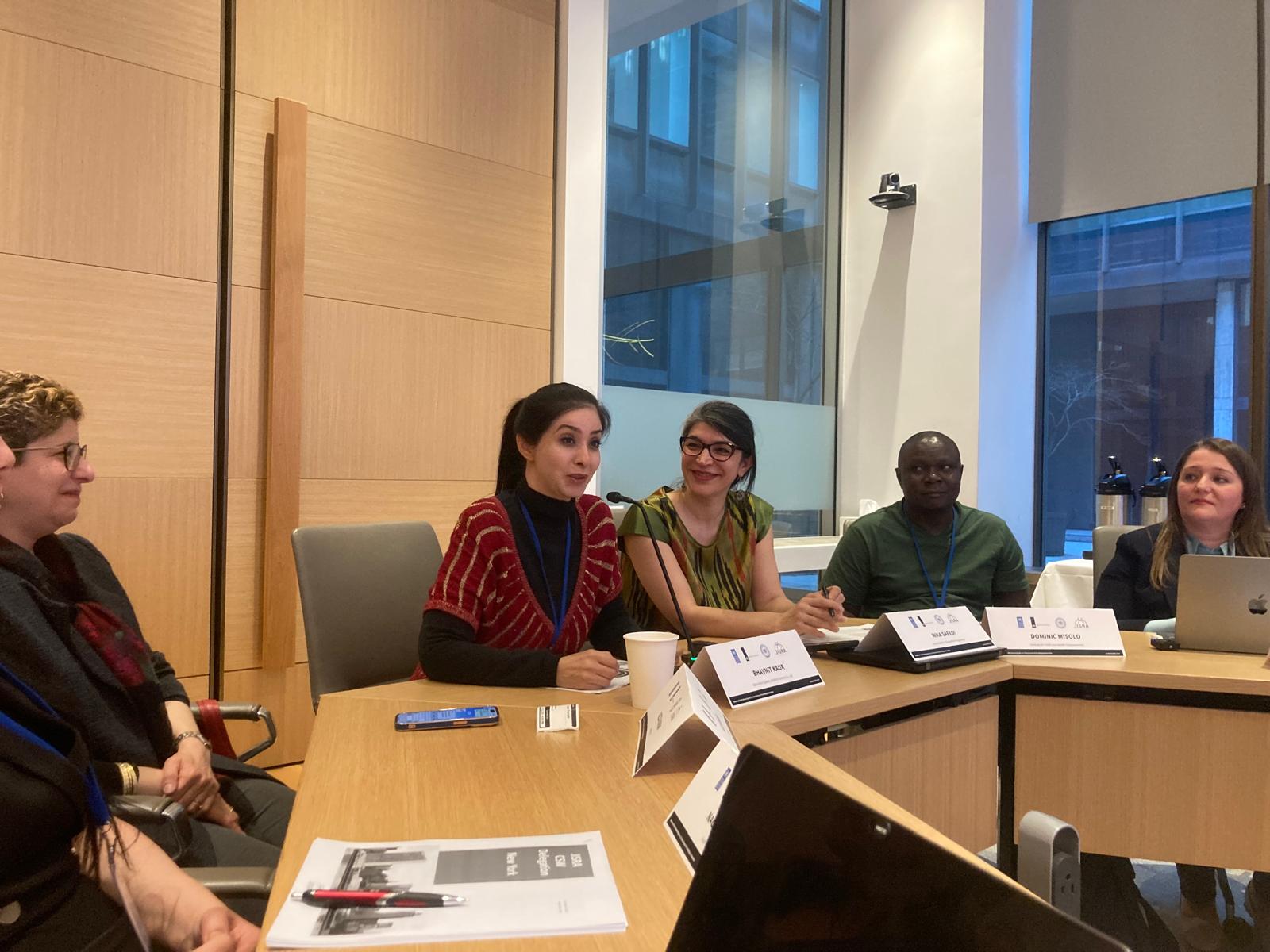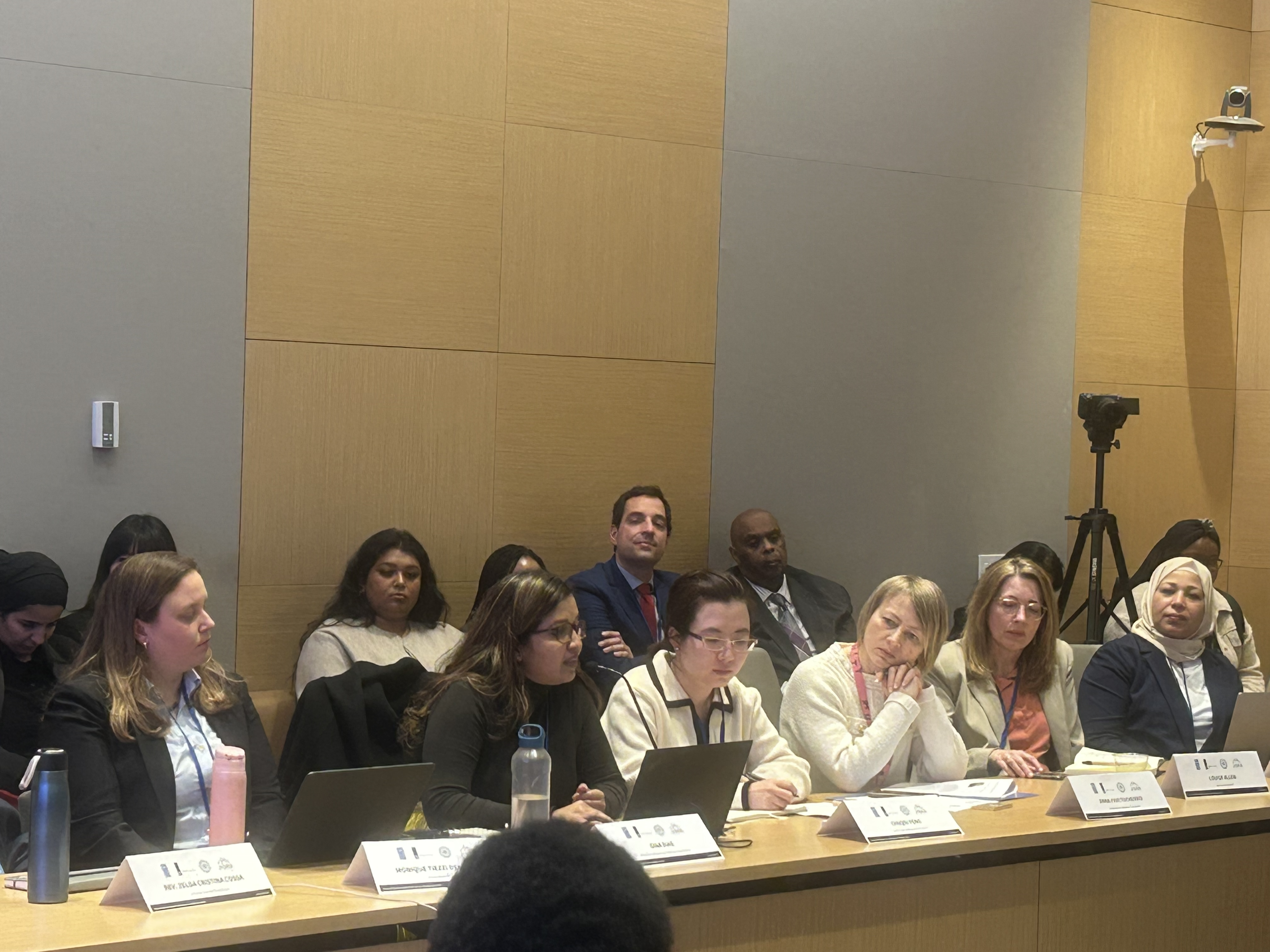Women of Faith Advancing the 12 Critical Areas of the Beijing Declaration
CSW69 Beijing+30 Roundtable | March 2025
Women and young women of faith continue to lead in crisis response, peacebuilding, and community development, yet their leadership remains undervalued. This must change.

Speakers and attendees of the CSW69 Beijing+30 roundtable. March 2025.
In alignment with the 69th Commission on the Status of Women priority theme, the roundtable dialogue, co-hosted by the UN Development Programme (UNDP), the Permanent Mission of the Kingdom of the Netherlands to the United Nations, the Ministry of Family and Human Rights Development of Somalia, and the Joint Initiative for Strategic Religious Action (JISRA), provided a platform to explore how women and young women in crisis-affected communities contribute to advancing the 12 critical areas of concern outlined in the Beijing Declaration.
Women and young women of faith play a pivotal role in achieving the Beijing Platform for Action’s objectives. Faith engagement must be recognized by local and international communities as a vital force for sustainable and inclusive development. During the High-Level Opening Remarks, Shoko Noda, United Nations Assistant Secretary-General of the United Nations Development Programme Assistant Administrator, and Director of the Crisis Bureau, reiterated that,
“Faith is a powerful force for social transformation, reaching into parts of communities in ways that policies alone cannot.”
Noda highlighted the importance of investing more in women-led faith movements, particularly grassroots-driven initiatives. She asserted that it is essential to ensure women of faith, who are driving meaningful change within their communities, receive the necessary support. Noda concluded her remarks reiterating, “Sustainable development really means inclusive development, ensuring women of faith have a seat at the table.”
Following Noda’s remarks, Peter Derrek Hof, Director of Social Development and Ambassador for Women’s Rights and Gender Equality for the Dutch Ministry of Foreign Affairs, highlighted the remarkable work done by the Kenyan Women of Faith Network to collaborate with leaders across various sectors and strengthen the rights of women without the hindrance from religious divides. Hof illustrated how their work is transcending barriers to target critical issues, including discrimination and combating violence against women and girls. Hof emphasized that women of faith across different religions and regions offer valuable perspectives for transformative change and espousing gender justice, calling to “empower women in all aspects of society.”

Peter Derrek Hof, Director of Social Development and Ambassador for Women’s Rights and Gender Equality for the Dutch Ministry of Foreign Affairs, delivering his high-level remarks during the roundtable. March 2025.
Following the High-Level Opening Remarks, the discussion spotlighted women and young women of faith from around the world. Kawther Alkholy Ramadan, Executive Director of the Women for Justice Foundation (WJF), asserted that gender equality and Freedom of Religion or Belief (FoRB) are deeply interconnected and require intersectional solutions. Ramadan highlighted a campaign in Egypt that empowered women to pressure policymakers and push religious discourse to correct harmful narratives from within. The initiative supports tools for justice and underscores the importance of intersectional solutions in advancing gender equality and FoRB. Ramadan further praised ongoing efforts, including on social media and within protest movements, stating, “Gen Z activists are redefining social justice and religious freedom.”
Rev. Zelda Cossa, Project Coordinator for the Economic Justice Project at the Christian Council of Churches in Mozambique, emphasized how the lack of adequate data on gender-based violence is a significant barrier to effective policy making and research. She called for integration and coordination efforts to establish comprehensive support systems for survivors. Cossa highlighted the crucial role of women of faith in influencing cultural norms and attitudes, which is essential for advancing gender equality. Following, Monique Tiezzi Den Hartog, Researcher for the International Relations Research Center of Universidade de São Paulo and International Associate for Brazil Soka Gakkai, reiterated the importance of showcasing the efforts of faith-based organizations, especially in educating the public about democracy and human rights.
Bhavnit Kaur Singhsachakul, Director at The Qonsultant Sphere, pointed out the importance of addressing the gap in youth engagement. Meaning, while young people are eager to participate in activism at both the community and global levels, many are unsure how to do so effectively. Singsachakul called for promoting collaboration with youth and fostering intergenerational dialogue across key processes.

Bhavnit Kaur Singhsachakul, Director at The Qonsultant Sphere, providing remarks during the roundtable. March 2025.
Ruby Kholifah, the Secretary General of the Asian Muslim Action Network (AMAN), emphasized the importance of supporting women-led faith movements to promote societal transformation through religious scholarship and community activism. Through the Women’s Ulama in Indonesia, their collaboration with faith leaders on feminist interpretations of religious texts can, “challenge patriarchal systems by claiming religious authority, creating new narratives.” She states,
“[It is essential to empower women of faith leaders and facilitate intersectional education and dialogue.] It’s not about inclusion; it’s about transformation … they are rebuilding the table itself.”
Dr. Saba Haddad, a Representative of the Baha’i International Community – Geneva Office, reaffirmed the important role of women of faith in driving transformation, stating, “the capacities these women have can bring miracles.” Dr. Haddad highlighted the necessity of consulting at the grassroots level to understand local issues and advocated for the development of targeted initiatives with “women at the heart.”
During her closing remarks, Gina Dias, Programme Manager for Sub-Saharan Africa at the Network for Religious and Traditional Peacemakers, reiterated the essential role that women of faith play in mediating conflicts and supporting their communities. She stressed the need for improved access to resources and policy reforms to protect their rights as peacemakers and activists, ensuring sustainable change. Dias emphasized the significant contributions of women of faith through the JISRA program, including a universal periodic review on FoRB in JISRA countries, affirming their efforts have “achieved impact that will reach far beyond JISRA.”

Gina Dias, Programme Manager for Sub-Saharan Africa at the Network for Religious and Traditional Peacemakers, delivering closing remarks during the roundtable. March 2025.
Follow the Peacemakers Network on social
